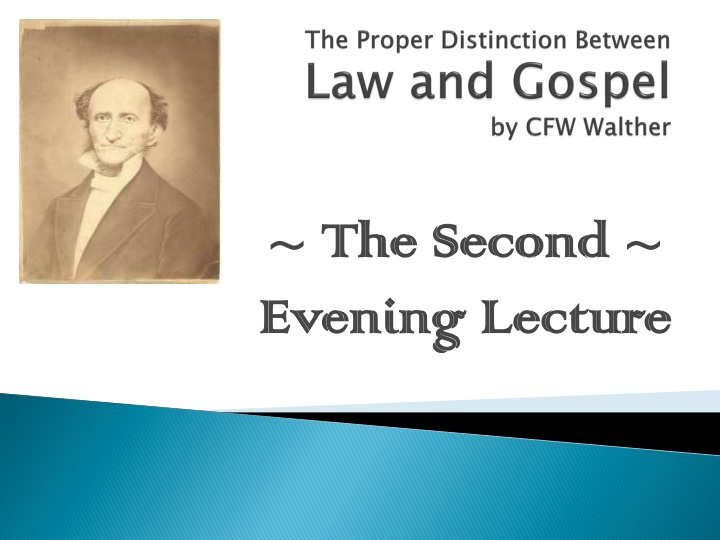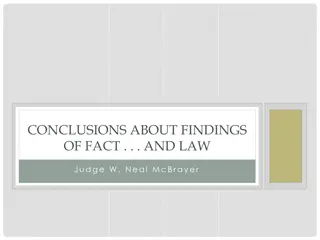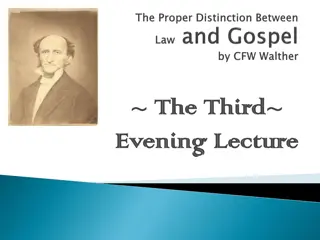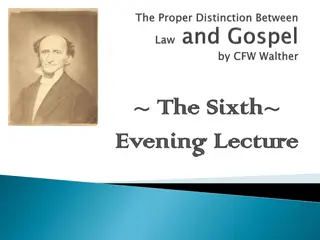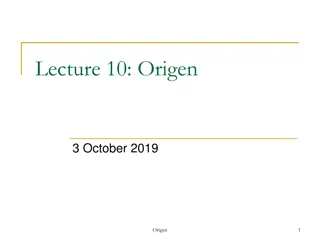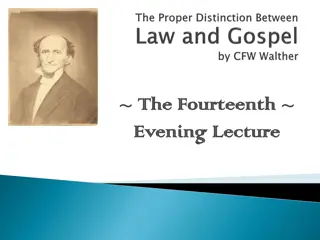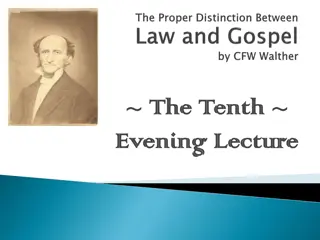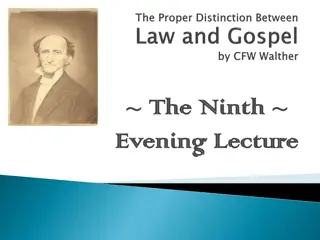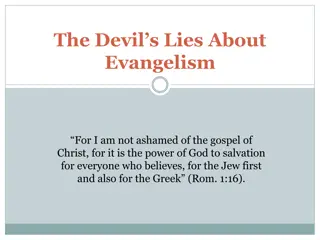The Vital Distinction Between Law and Gospel in Scripture
The Holy Scriptures are comprised of two fundamental doctrines - the Law and the Gospel - inherently different yet intertwined. The Law reveals sin without providing a means for redemption, leading to despair, while the Gospel offers hope and salvation to those who embrace it. As Christians, understanding the unique roles of Law and Gospel is essential for spiritual growth and maturity.
Download Presentation

Please find below an Image/Link to download the presentation.
The content on the website is provided AS IS for your information and personal use only. It may not be sold, licensed, or shared on other websites without obtaining consent from the author.If you encounter any issues during the download, it is possible that the publisher has removed the file from their server.
You are allowed to download the files provided on this website for personal or commercial use, subject to the condition that they are used lawfully. All files are the property of their respective owners.
The content on the website is provided AS IS for your information and personal use only. It may not be sold, licensed, or shared on other websites without obtaining consent from the author.
E N D
Presentation Transcript
~ The Second ~ ~ The Second ~ Evening Lecture Evening Lecture
What is the most important teaching of Scripture? What is the second-most important? What do Law and Gospel have in common? How do they differ? How do the initials SOS remind us of the difference between Law and Gospel?
The doctrinal contents of the entire Holy Scriptures, both of the Old and the New Testament, are made up of two doctrines differing fundamentally from each other, viz., the Law and the Gospel. The doctrinal contents of the entire Holy Scriptures, both of the Old and the New Testament, are made up of two doctrines differing fundamentally from each other, viz., the Law and the Gospel.
The moment a person becomes a Christian, there arises in him a keen desire for the doctrine of Christ. Even where there is but the beginning of faith in the heart, a person regards no point of doctrine as trifling, and every doctrine is to him as precious as gold, silver, and rubies
the Law tells us what to do, but does not enable us to comply with its commands; it rather causes us to become more unwilling to keep the Law.
The Law uncovers to man his sins, but offers him no help to get out of them and thus hurls man into despair.
not a drop of comfort to the sinner. If no additional teaching, besides the Law, is applied to man, he must despair, die, and perish in his sins. Ever since the Fall the Law can produce no other effects in man.
The Letter of the Law! because God has inscribed it in the form of letters upon tables of stone.
The Law produces an effect opposite to that which it commands! The statement of the profligate poet Ovid is well known: We strive after the forbidden thing and always lust after those things which are denied us.
The Law. The Israelites, at Mount Sinai, were given the Ten Commandments, they were all a-tremble. The rich young man went away sorrowful. When Paul preached to Felix, the governor, concerning righteousness, temperance, and the Judgment to come, we read that Felix trembled.
The Gospel, when demanding faith, offers and gives us faith in that very demand.
The Gospel does not at all reprove the sinner, but takes all terror, all fear, all anguish, from him and fills him with peace and joy in the Holy Ghost. In the Parable of the Prodigal Son, the father does not with a single word refer to his horrible, abominable conduct. He says nothing, nothing whatever, about it, but falls upon the prodigal s neck, kisses him, and prepares a splendid feast for him. That is a glorious parable exhibiting to us the effect of the Gospel. It removes all unrest and fills us with a blessed, heavenly peace.
it changes man. It plants love into his heart and makes him capable of all good works. It demands nothing, but it gives all.
Acts 16:31: So they said, "Believe on the Lord Jesus Christ, and you will be saved, you and your household. The jailer does not say to the apostles: How am I to go at this? No; he promptly believes, for the apostles words have spoken faith into his heart. The story concerning him goes on immediately: He rejoiced, believing in God with all his house. Observe that the Gospel bestows the faith which it demands.
Effect. Ephesians 2:8-10: For by grace you have been saved through faith, and that not of yourselves; it is the gift of God,9 not of works, lest anyone should boast.10 For we are His workmanship, created in Christ Jesus for good works, which God prepared beforehand that we should walk in them. The Gospel does not say: You must do good works, but it fashions me into a human being, into a creature of such a kind as cannot but serve God and his fellow-man.
lt relates to the persons to whom either doctrine is to be preached. In other words, there is a difference in the subjects to whom they must be applied.
The Law is to be preached to secure sinners and the Gospel to alarmed sinners.
As long as a person is at ease in his sins, as long as he is unwilling to quit some particular sin, so long only the Law, which curses and condemns him, is to be preached to him.
To such poor, sad-hearted sinners I repeat it not a word of the Law must be preached. Woe to the preacher who would continue to preach the Law to a famished sinner! On the contrary, to such a person the preacher must say: Do but come! There is still room! No matter how great a sinner you are, there is still room for you. Even if you were a Judas or a Cain, there is still room. Oh, do, do come to Jesus!
In offering us help and salvation as a gift and donation of God, the Gospel bids us hold the sack open and have something given us. The Law, however, gives nothing, but only takes and demands things from us. Now, these two, giving and taking, are surely far apart.
